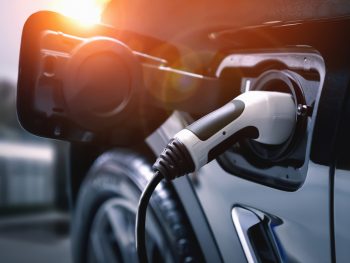Autumn Statement 2022: Electric cars and vans to pay vehicle tax from 2025
The Chancellor has announced electric vehicles will no longer be exempt from Vehicle Excise Duty from April 2025 in a move to make the motoring tax system “fairer”.

The Treasury said the decision would ”ensure that all road users begin to pay a fair tax contribution as the take up of electric vehicles continues to accelerate”
Jeremy Hunt predicted half of new cars would be electric by 2025 in the run-up to the 2030 ICE ban and said that electric cars, vans and motorcycles would begin to pay VED in the same way as petrol and diesel vehicles, although on the lowest rates.
The measure, which will be legislated for in the Autumn Finance Bill 2022, will affect both new and existing electric cars and vans.
New zero-emission cars registered on or after 1 April 2025 will be liable to pay the lowest first year rate of VED, which applies to vehicles with CO2 emissions 1 to 50g/km and currently stands at £10 a year. From the second year of registration onwards, they will move to the standard rate, currently £165 a year.
But while zero-emission cars first registered between 1 April 2017 and 31 March 2025 escape the first-year rate, they will have to pay the standard rate, as above.
And zero- and low-emission cars first registered between 1 March 2001 and 30 March 2017 currently in Band A will move to the Band B rate, currently £20 a year.
The Treasury also said the Expensive Car Supplement exemption for electric vehicles would end in April 2025. At present, all cars with a list price of more than £40,000 have to pay an extra £355 a year for five years after the first year’s CO2-based charge, but zero-emission cars are exempt.
Meanwhile, zero-emission vans will move to the rate for petrol and diesel light goods vehicles, currently £290 a year for most vans. Zero-emission motorcycles and tricycles will move to the rate for the smallest engine size, currently £22 a year. And rates for Alternative Fuel Vehicles and hybrids will also be equalised.
The much-anticipated announcement forms part of efforts to plug a growing black hole in vehicle-related income from both VED and fuel duty as drivers go electric. A forecast from the Office for Budget Responsibility had indicated that fuel duty and VED revenue would fall to £2.1bn by 2026-27, compared to the estimated £35bn that is currently raised.
A look at the Autumn Statement policy costings reveals the “equalised treatment” of VED liability, already branded the ‘Tesla Tax’ by some, will now generate an extra £515m in 2025/6, £985m in 2026/7 and £1.595bn in 2027/8.
A fair tax contribution or a premature move?
The Treasury said the decision would ”ensure that all road users begin to pay a fair tax contribution as the take up of electric vehicles continues to accelerate”.
But David Savage, vice president, UK and Ireland at Geotab, said the decision was hugely disappointing.
“We’re just eight years out from the cessation of internal combustion engine-powered cars in the UK and very much at the crux of the transition to electric.
“EVs are currently exposed to a number of challenging external factors, from soaring electricity tariffs, higher VAT for public charging versus home, and increased list prices of the vehicles themselves. Despite this, the Government has responded by terminating the plug-in car grant incentive scheme for EVs – and now is introducing Vehicle Excise Duty (VED) on electric cars for the first time.”
Savage added that the series of decisions from the Government was “demonstrably stifling the economic viability” of the EV transition.
“Moving forward, we hope to see more focused investment and support from the Government to accelerate the shift to electric ahead of its 2050 net zero ambitions,” he added.
Toby Kernon, CEO of vehicle subscription software firm Wagonex, said the move was a “significant ‘own goal’ by the Government.
“The UK has specific, ambitious targets to reach net zero, which we are already struggling to meet, so to start taxing EVs will only add to this burden, and more worryingly, could be a sign of things to come.”
He continued: “While they’re often more expensive to buy than many diesel or petrol cars, the running costs are generally lower. So, adding tax to these vehicles could be a deterrent to future growth.”
But Ashley Barnett, head of fleet consultancy at Lex Autolease, said the move wouldn’t immediately stall EV uptake. Although he added that VED must continue to operate fairly based on emissions, to encourage a move towards cleaner vehicles – many had expected an announcement on road pricing to be made today.
Barnett commented: “The electric vehicle market has grown exponentially in recent years, creating a shortfall in motoring tax revenue. However, when coupled with rising vehicle and electricity prices, we must remain cautious of introducing further barriers to adoption.
“The introduction of VED on EVs won’t immediately stall future uptake, but it does highlight the need for a more coherent and joined-up conversation between government departments and industry bodies to simplify what is becoming an overly complicated vehicle taxation system. Vehicle Excise Duty must operate in a fair, emissions-based way if we are going to continue to clean up the older and more polluting vehicles on the UK’s roads.”
On the flip side, RAC head of policy Nicholas Lyes said it was probably fair that the Government gets owners of electric vehicles to start contributing to the upkeep of major roads from 2025.
He continued: “While Vehicle Excise Duty rates are unlikely to be a defining reason for vehicle choice, we believe a first year zero-VED rate benefit should have been retained as a partial incentive. But we don’t expect this tax change to have much of an effect on dampening the demand for electric vehicles given the many other cost benefits of running one.”












